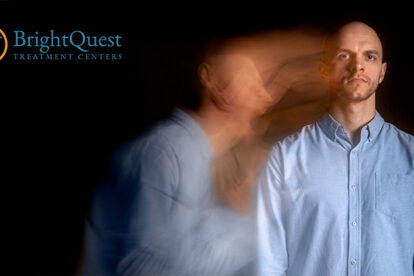The Top 4 Barriers to Treatment for Schizophrenia and How To Overcome Them

While people can discover a much-improved quality of life with treatment for schizophrenia, a number of significant barriers stand in the way of this recovery path: lack of awareness among families and communities at large, stigma and fear among the same, delayed or mistaken diagnosis, as well as clients’ own resistance can set treatment back or stall it altogether. But dissolving these barriers starts with every single one of us in how we talk about schizophrenia and prioritize mental health in general.
Living with schizophrenia, for many, means living with fear, confusion, loneliness, shame, and embarrassment. These unfortunate feelings are all possible to remedy and avoid, but sometimes it takes years for a person to get help, and some people never get treatment. This delay can mean serious physical, emotional, and life consequences.
A survey of psychiatrists and caregivers finds that it takes an average of almost three years for someone to get psychiatric care once schizophrenia symptoms arise. Comprehensive quality care is available, and none of the barriers to treatment for schizophrenia rival the value of recovery and peace of mind for those who suffer.
Let’s look at some of these common barriers, how they might be affecting someone in your life with schizophrenia, and how we can overcome these obstacles on the road to recovery.
#1 Lack of Awareness
One of the biggest barriers to schizophrenia treatment is misunderstanding and lack of awareness about the severity of this mental health disorder and the transformative treatment options that are available. This oversight can be on the part of the individual as well as their family, and it can delay recovery when the person doesn’t get timely attention, diagnosis, and care.
Families can learn to recognize the signs and symptoms of schizophrenia:
- Auditory or visual hallucinations
- Delusional thoughts
- Confusion and irrational thoughts
- Repeated, compulsive movements
- Lack of concentration and focus
- Memory difficulties
- Emotional numbness or volatility
While you may not know for sure whether your loved one has schizophrenia or what the next step is, it is best to reach out to a mental health treatment center with your observations and questions.
#2 Stigma and Fear
Another powerful obstacle to treatment is the stigma surrounding schizophrenia and mental health disorders in general. Fear arises in the community, in families, and even in the individual when misunderstandings prevail. People can be in denial about the seriousness of their own or a loved one’s symptoms. They can feel embarrassed to seek help or if someone in their family needs mental health care. People may even doubt that those with schizophrenia can live normal lives and, therefore, downplay the value of treatment.
This misguided thinking puts concerns about others’ opinions far above the immediate needs of someone with a treatable disorder. Many people with schizophrenia already feel isolated due to their symptoms; shame and stigma can further their isolation and exacerbate the other barriers to treatment.
#3 Delayed Diagnosis
Another complication that impedes adequate and personalized treatment for each individual with schizophrenia is an improper or delayed diagnosis. This may be due to a lack—or avoidance—of medical care altogether, someone’s failure to report specific symptoms that might point to a schizophrenia diagnosis, or a doctor’s mistake or oversight. Symptoms can sometimes be mistaken for depression or other mood disorders, attention deficit hyperactivity disorder, other psychotic disorders, or substance abuse.
Regardless of the stigma associated with schizophrenia, it will never serve someone to have an incorrect diagnosis because it will block access to the most effective treatment. The sooner someone can receive a proper diagnosis for schizophrenia and any co-occurring disorders, the sooner they can get on the road to living their best life. At integrative mental health treatment centers, clinicians are prepared to consider all of the symptoms the client and family members can report, as well as family history, any other mental health disorders present, and other factors that might be provoking psychosis such as substance abuse. A complete diagnosis may include a schizophrenia subtype, and it will influence a very specific and comprehensive plan of care for the client.
#4 Client Resistance
A sensitive barrier to schizophrenia treatment involves the client’s own resistance—whether due to denial, shame and stigma, or the particular symptoms of their disorder. Because schizophrenia can bring paranoia and delusional beliefs, a potential client may have a very difficult time trusting others and accepting help. They may even have a difficult time accepting help from their own families. While not an intentional obstruction to their own well-being, their confusion and refusal of treatment can result in diverse complications and a very poor quality of life.
Learn to Live Independently With Schizophrenia
Our Unique Treatment Model can Help
Breaking Down the Barriers to Treatment for Schizophrenia
Lack of awareness, understanding, and compassion can be such a significant barrier for people who need treatment for schizophrenia; as such, it’s up to us all to broaden our perspectives and make mental health more of a priority. The truth is that psychotic symptoms do not amount to someone being “crazy.” Rather, psychotic symptoms amount to a mental and behavioral imbalance that wants to find greater harmony. But someone with schizophrenia cannot heal on their own.
Fortunately, leading treatment centers are prepared to help families overcome these barriers to recovery. Clients do need to get connected to this valuable help in the first place, but treatment specialists can assist with this process as well. Once an optimal course of treatment is determined, it’s equally important that clients can adhere to this plan, so they can reclaim a life that is balanced and fulfilled. Comprehensive treatment programs for schizophrenia help to establish a wide-reaching support system—that includes family, peers, and clinicians and therapists—that will last so a client can maintain their treatment plan and their best life.
If you’re concerned about a loved one and believe they may need residential care, we can help. BrightQuest offers long-term treatment for people struggling with complex mental health illnesses and co-occurring disorders. Contact us to learn more about our renowned program and how we can help you or your loved one start the journey toward recovery.






